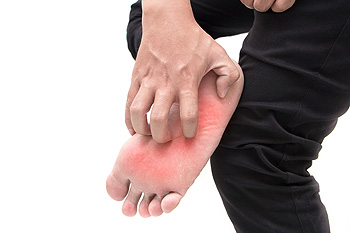What Children Need to Know About Athlete’s Foot
Monday, 26 March 2018 00:00 A fungus that lives on the toes and the bottom of feet is referred to as athlete’s foot. Public pools and showers are often a breeding ground for this type of fungus, and it may appear on your feet if you tend to walk barefoot in these areas. Parents may suggest wearing flip flops or shower shoes in public areas because they know the fungus can spread. There may be several signs you may notice that can indicate this condition is evident, including any blistered or cracked skin especially between the toes, severe itching, or a rash that appears on the inside of the foot. There are simple yet effective ways to prevent athlete’s foot from developing. Washing and drying the feet is important in keeping this ailment from spreading, and wearing proper footwear in public areas will decrease the chances of this condition from growing. If you have any symptoms relating to athletes foot, please ask your parents to schedule a consultation with a podiatrist for additional information.
A fungus that lives on the toes and the bottom of feet is referred to as athlete’s foot. Public pools and showers are often a breeding ground for this type of fungus, and it may appear on your feet if you tend to walk barefoot in these areas. Parents may suggest wearing flip flops or shower shoes in public areas because they know the fungus can spread. There may be several signs you may notice that can indicate this condition is evident, including any blistered or cracked skin especially between the toes, severe itching, or a rash that appears on the inside of the foot. There are simple yet effective ways to prevent athlete’s foot from developing. Washing and drying the feet is important in keeping this ailment from spreading, and wearing proper footwear in public areas will decrease the chances of this condition from growing. If you have any symptoms relating to athletes foot, please ask your parents to schedule a consultation with a podiatrist for additional information.
Athlete’s foot is an inconvenient condition that can be easily reduced with the proper treatment. If you have any concerns about your feet and ankles, contact Dr. Steven Schwartz from Pennsylvania. Our doctor will treat your foot and ankle needs.
Athlete’s Foot: The Sole Story
Athlete's foot, also known as tinea pedis, can be an extremely contagious foot infection. It is commonly contracted in public changing areas and bathrooms, dormitory style living quarters, around locker rooms and public swimming pools, or anywhere your feet often come into contact with other people.
Solutions to Combat Athlete’s Foot
- Hydrate your feet by using lotion
- Exfoliate
- Buff off nails
- Use of anti-fungal products
- Examine your feet and visit your doctor if any suspicious blisters or cuts develop
Athlete’s foot can cause many irritating symptoms such as dry and flaking skin, itching, and redness. Some more severe symptoms can include bleeding and cracked skin, intense itching and burning, and even pain when walking. In the worst cases, Athlete’s foot can cause blistering as well. Speak to your podiatrist for a better understanding of the different causes of Athlete’s foot, as well as help in determining which treatment options are best for you.
If you have any questions please feel free to contact our offices located in Chambersburg, and Mcconnellsburg, PA . We offer the newest diagnostic and treatment technologies for all your foot and ankle needs.

